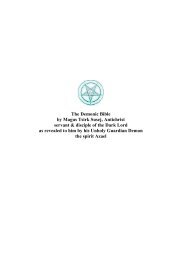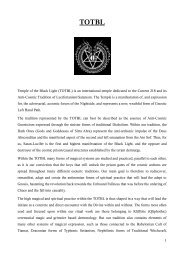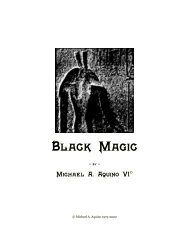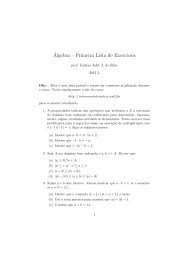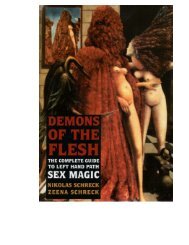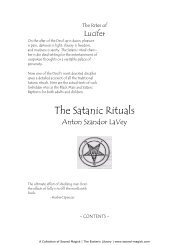Satanism Today - An Encyclopedia of Religion, Folklore and Popular ...
Satanism Today - An Encyclopedia of Religion, Folklore and Popular ...
Satanism Today - An Encyclopedia of Religion, Folklore and Popular ...
Create successful ePaper yourself
Turn your PDF publications into a flip-book with our unique Google optimized e-Paper software.
184 Neopagan Witchcraft<br />
encountering departed friends <strong>and</strong> relatives who<br />
show up to greet them, <strong>and</strong> a meeting with a<br />
powerful, spiritual Being who some have called an<br />
angel, God, or Jesus.<br />
Although most near-death experiencers report<br />
encounters with departed relatives <strong>and</strong> beings <strong>of</strong><br />
love, others are less positive. Instead <strong>of</strong> ascents into<br />
realms <strong>of</strong> light, the latter experiencers report<br />
descents into hellish darkness, confusion, <strong>and</strong><br />
even torment. In some cases, they even report<br />
hearing screams <strong>and</strong> cries <strong>of</strong> pain, presumably<br />
from damned souls suffering in hell. These individuals<br />
emerge from their experience with fear.<br />
Such reports have generated controversy among<br />
NDE researchers. People like Moody assert that in<br />
all the years <strong>of</strong> their study, they have never talked<br />
with anyone who had hellish experiences. Critics<br />
have been quick to note that most <strong>of</strong> the individuals<br />
championing the reality <strong>of</strong> negative NDE experiences<br />
are conservative Christians, who are thus<br />
predisposed to take such reports seriously because<br />
<strong>of</strong> the implicit support they provide for the reality<br />
<strong>of</strong> their particular theological perspective.<br />
See also Demons; Hell <strong>and</strong> Heaven<br />
For Further Reading:<br />
Moody, Raymond A. Life After Life. New York:<br />
Bantam, 1976.<br />
———. The Light Beyond. New York: Bantam,<br />
1989.<br />
Rawlings, Maurice S. To Hell <strong>and</strong> Back. Nashville:<br />
Thomas Nelson, 1993.<br />
Scott, Miriam Van. <strong>Encyclopedia</strong> <strong>of</strong> Hell. New York:<br />
Thomas Dunne Books, 1998.<br />
Neopagan Witchcraft<br />
The word witch has several possible meanings: (1)<br />
In the academic discipline <strong>of</strong> anthropology, a<br />
witch is a negative sorcerer found in the folklore <strong>of</strong><br />
societies across the globe. (2) The English word<br />
witch, from which the anthropological term was<br />
taken, refers specifically to a female wizard, traditionally<br />
viewed as practicing black magic <strong>and</strong> as<br />
being in league with Satan. (3) Finally, a significant<br />
number <strong>of</strong> participants in the neopagan movement<br />
refer to themselves as witches or Wiccans.<br />
Although contemporary Satanists <strong>and</strong> neopagan<br />
witches both draw from a number <strong>of</strong> the same<br />
intellectual currents <strong>and</strong> are similar on many<br />
points, there is animosity between the two movements.<br />
Thus while some contemporary Satanist<br />
groups that utilize elements from pre-Christian<br />
religions are also technically neopagan, they<br />
would most likely reject this label.<br />
Modern neopaganism aims to recreate the<br />
pagan religions <strong>of</strong> antiquity—usually not as they<br />
actually were, but as they have been idealized by<br />
romantics ever since the Renaissance. There were a<br />
number <strong>of</strong> attempts at recreating pagan religions<br />
in the late nineteenth <strong>and</strong> early twentieth<br />
centuries, most <strong>of</strong> which left only literary remains.<br />
One <strong>of</strong> the few groups to make a lasting contribution<br />
to the religious l<strong>and</strong>scape was Wicca, founded<br />
in Great Britain in the mid-twentieth century by<br />
Gerald B. Gardner, a retired civil servant. Partly<br />
because Wicca is focused on the worship <strong>of</strong><br />
goddesses, it has been adopted by feminists<br />
attempting to create alternative forms <strong>of</strong> spirituality<br />
that are free from the biases <strong>of</strong> traditional<br />
male-dominated religion.<br />
Building on the speculative scholarship <strong>of</strong><br />
Margaret Murray <strong>and</strong> others, Gardner accepted<br />
the notion that the Inquisition represented an<br />
effort by the Church to destroy lingering remnants<br />
<strong>of</strong> pre-Christian paganism. Gardner further<br />
claimed to have been initiated into one <strong>of</strong> the last<br />
surviving traditional covens. By virtue <strong>of</strong> this<br />
claim, he was able to assert that Wicca was a lineal<br />
descendant <strong>of</strong> the “old religion” <strong>of</strong> Europe, antedating<br />
Christianity by millennia. This claim has,<br />
however, been thoroughly discredited. Although<br />
he was undoubtedly sincere in his desire to revive<br />
archaic paganism, Gardner’s claim to have been<br />
initiated into a coven with an ancient lineage was<br />
fabricated as a strategy designed to give his<br />
nascent movement greater legitimacy. Instead <strong>of</strong><br />
representing the survival <strong>of</strong> an ancient religion,<br />
Wicca was a creative synthesis <strong>of</strong> elements drawn<br />
from Freemasonry, ceremonial magic, Aleister<br />
Crowley, Robert Graves’s notion <strong>of</strong> a pre-<br />
Christian goddess religion, Charles Godfrey<br />
Lel<strong>and</strong>’s “Witches Gospel,” Murray’s imaginative<br />
reconstruction <strong>of</strong> the “old religion” from<br />
Inquisition records, <strong>and</strong> other sources.<br />
In contrast, <strong>An</strong>ton LaVey, the person usually<br />
regarded as the founder <strong>of</strong> modern <strong>Satanism</strong>,<br />
never claimed to be the lineal descendant <strong>of</strong> an




